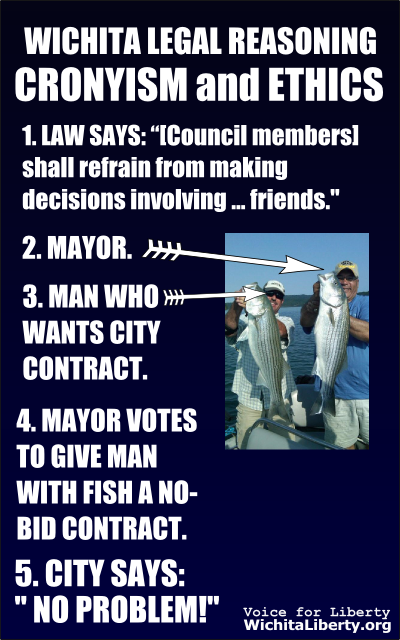A new law in Kansas may provide opportunities for better enforcement of the Kansas Open Records Act.
This year the Kansas Legislature passed HB 2256, captioned as “An act concerning public bodies or agencies; relating to the state of Kansas and local units of government; providing certain powers to the attorney general for investigation of violations of the open records act and the open meetings act; attorney general’s open government fund …”
The good part of this law is that it provides additional enforcement options when citizens feel that government agencies are not complying with the Kansas Open Records Law. Before this law, citizens and news organizations had — effectively — two paths for seeking enforcement of KORA. One is private legal action at their own expense. The other is asking the local district attorney for an opinion.
Now the Kansas Attorney General may intervene, as noted in the summary of the new law: “The bill allows the Attorney General to determine, by a preponderance of the evidence after investigation, that a public agency has violated KORA or KOMA, and allows the Attorney General to enter into a consent order with the public agency or issue a finding of violation to the public agency prior to filing an action in district court.”
Not all aspects of this bill are positive, as it also confirms many exceptions to the records act and adds to them. It also adds to the authority of the Attorney General, as have other bills this year.
The City of Wichita has been obstinate in its insistence that the Kansas Open Records Act does not require it to fulfill certain requests for records of spending by its subordinate tax-funded agencies. The city believes that certain exceptions apply and allow the city to keep secret records of the spending of tax funds. The city may be correct in its interpretation of this law.
But the law — even if the city’s interpretation is correct — does not prohibit the city from releasing the records. The city could release the records, if it wanted to.
Fulfilling the legitimate records requests made by myself and others would go a long way towards keeping promises the city and its officials make, even recent promises.
The city’s official page for the mayor holds this: “Mayor Longwell has championed many issues related to improving the community including government accountability, accessibility and transparency …”
During the recent mayoral campaign, Longwell told the Wichita Eagle that he wants taxpayers to know where their money goes: “The city needs to continue to improve providing information online and use other sources that will enable the taxpayers to understand where their money is going.”
In a column in the Wichita Business Journal, Wichita Mayor Jeff Longwell wrote: “First off, we want City Hall to be open and transparent to everyone in the community.”
Following, from 2012, discussion of problems with the City of Wichita and open government.
Wichita, again, fails at open government
The Wichita City Council, when presented with an opportunity to increase the ability of citizens to observe the workings of the government they pay for, decided against the cause of open government, preferring to keep the spending of taxpayer money a secret.
The occasion was consideration of renewing its contract with Go Wichita Convention and Visitors Bureau. I asked, as I have in the past for this agency and also for Wichita Downtown Development Corporation and Greater Wichita Economic Development Coalition, that they consider themselves to be what they are: public agencies as defined in the Kansas Open Records Act.
In the past I’ve argued that Go Wichita is a public agency as defined in the Kansas Open Records Act. But the city disagreed. And astonishingly, the Sedgwick County District Attorney agrees with the city’s interpretation of the law.
So I asked that we put aside the law for now, and instead talk about good public policy. Let’s recognize that even if the law does not require Go Wichita, WDDC, and GWEDC to disclose records, the law does not prohibit them from fulfilling records requests.
Once we understand this, we’re left with these questions:
Why does Go Wichita, an agency funded almost totally by tax revenue, want to keep secret how it spends that money, over $2 million per year?
Why is this city council satisfied with this lack of disclosure of how taxpayer funds are spent?
Why isn’t Go Wichita’s check register readily available online, as it is for Sedgwick County?
For that matter, why isn’t Wichita’s check register online?
It would be a simple matter for the council to declare that the city and its taxpayer-funded partner agencies believe in open government. All the city has to have is the will to do this. It takes nothing more.
Only Wichita City Council Member Michael O’Donnell (district 4, south and southwest Wichita) gets it, and yesterday was his last meeting as a member of the council. No other council members would speak up in favor of citizens’ right to open government.
But it’s much worse than a simple failure to recognize the importance of open government. Now we have additional confirmation of what we already suspected: Many members of the Wichita City Council are openly hostile towards citizens’ right to know.
In his remarks, Wichita City Council Member Pete Meitzner (district 2, east Wichita) apologized to the Go Wichita President that she had become “a pawn in the policy game.” He said it was “incredibly unfair that you get drawn into something like this.”
He added that this is a matter for the Attorney General and the District Attorney, and that not being a lawyer, she shouldn’t be expected to understand these issues. He repeated the pawn theme, saying “Unfortunately there are occasions where some people want to use great people like yourself and [Wichita Downtown Development Corporation President] Jeff Fluhr as pawns in a very tumultuous environment. Please don’t be deterred by that.”
Mayor Brewer added “I would have to say Pete pretty much said it all.”
We’ve learned that city council members rely on — as Randy Brown told the council last year — facile legal reasoning to avoid oversight: “It may not be the obligation of the City of Wichita to enforce the Kansas Open Records Act legally, but certainly morally you guys have that obligation. To keep something cloudy when it should be transparent I think is foolishness on the part of any public body, and a slap in the face of the citizens of Kansas. By every definition that we’ve discovered, organizations such as Go Wichita are subject to the Kansas Open Records Act.”
But by framing open government as a legal issue — one that only lawyers can understand and decide — Wichita city government attempts to avoid criticism for their attitude towards citizens.
It’s especially absurd for this reason: Even if we accept the city’s legal position that the city and its quasi-governmental taxpayer-funded are not required to fulfill records request, there’s nothing preventing from doing that — if they wanted to.
In some ways, I understand the mayor, council members, and bureaucrats. Who wants to operate under increased oversight?
What I don’t understand is the Wichita news media’s lack of interest in this matter. Representatives of all major outlets were present at the meeting.
I also don’t understand what Council Member Lavonta Williams (district 1, northeast Wichita) suggested I do: “schmooze” with staff before asking for records. (That’s not my word, but a characterization of Williams’ suggestion made by another observer.)
I and others who have made records requests of these quasi-governmental taxpayer-funded organizations have alleged no wrongdoing by them. But at some point, citizens will be justified in wondering whether there is something that needs to be kept secret.
The actions of this city have been noticed by the Kansas Legislature. The city’s refusal to ask its tax-funded partners to recognize they are public agencies as defined in the Kansas Open Records Act is the impetus for corrective legislation that may be considered this year.
Don’t let this new law be known as the “Wichita law.” Let’s not make Wichita an example for government secrecy over citizens’ right to know.
Unfortunately, that bad example has already been set, led by the city’s mayor and city council.




 The problem is that when the bank Schmitt works for makes a loan, there are several forces in play that are not present in government. Perhaps the most obvious is that a bank loans money and expects to be repaid. In the case of the forgivable loan the commission was considering, the goal is that the loan is not repaid. These loans, remember, are a grant of cash, subject to a few conditions. If the recipient company is required to repay the loan, it is because it did not meet conditions such as job count or capital investment. In these circumstances, the company is probably not performing well economically, and therefore may not be able to repay the loan.
The problem is that when the bank Schmitt works for makes a loan, there are several forces in play that are not present in government. Perhaps the most obvious is that a bank loans money and expects to be repaid. In the case of the forgivable loan the commission was considering, the goal is that the loan is not repaid. These loans, remember, are a grant of cash, subject to a few conditions. If the recipient company is required to repay the loan, it is because it did not meet conditions such as job count or capital investment. In these circumstances, the company is probably not performing well economically, and therefore may not be able to repay the loan.


 Tomorrow the
Tomorrow the 

 So there were no “estimates” that Key Construction bested. But there was an objectionable no-bid contract that the council agreed to. Fortunately for Wichita, a few people objected and overrode the council’s bad decision.
So there were no “estimates” that Key Construction bested. But there was an objectionable no-bid contract that the council agreed to. Fortunately for Wichita, a few people objected and overrode the council’s bad decision. Be advised: If you ask the mayor to adhere to this law, he may
Be advised: If you ask the mayor to adhere to this law, he may  shall refrain from making decisions involving business associates, customers, clients, friends and competitors; shall refrain from repeated and continued violation of city council rules; shall refrain from appointing immediate family members, business associates, clients or employees to municipal boards and commissions; shall refrain from influencing the employment of municipal employees; shall refrain from requesting the fixing of traffic tickets and all other municipal code citations; shall refrain from seeking the employment of immediate family members in any municipal operation; shall refrain from using their influence as members of the governing body in attempts to secure contracts, zoning or other favorable municipal action for friends, customers, clients, immediate family members or business associates; and shall comply with all lawful actions, directives and orders of duly constituted municipal officials as such may be issued in the normal and lawful discharge of the duties of these municipal officials.
shall refrain from making decisions involving business associates, customers, clients, friends and competitors; shall refrain from repeated and continued violation of city council rules; shall refrain from appointing immediate family members, business associates, clients or employees to municipal boards and commissions; shall refrain from influencing the employment of municipal employees; shall refrain from requesting the fixing of traffic tickets and all other municipal code citations; shall refrain from seeking the employment of immediate family members in any municipal operation; shall refrain from using their influence as members of the governing body in attempts to secure contracts, zoning or other favorable municipal action for friends, customers, clients, immediate family members or business associates; and shall comply with all lawful actions, directives and orders of duly constituted municipal officials as such may be issued in the normal and lawful discharge of the duties of these municipal officials.


 respond to my request for the complete document. Which begs these questions: Why did the city feel that some information needed to be kept secret? Did city council members have access to the redacted information? Did any members of the public besides myself ask for the information? How many citizens might have been discouraged from asking by fear of the the hassle of asking city hall for information like this?
respond to my request for the complete document. Which begs these questions: Why did the city feel that some information needed to be kept secret? Did city council members have access to the redacted information? Did any members of the public besides myself ask for the information? How many citizens might have been discouraged from asking by fear of the the hassle of asking city hall for information like this?
 The legal stance of the City of Wichita certainly isn’t good public policy. It’s contrary to both the letter and spirit of the
The legal stance of the City of Wichita certainly isn’t good public policy. It’s contrary to both the letter and spirit of the